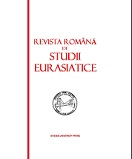ETHNICITY AND NATION IN DOBRUDJA -AN ANTHROPOLOGICAL-SOCIOLOGIC ANALYSIS-
ETHNICITY AND NATION IN DOBRUDJA -AN ANTHROPOLOGICAL-SOCIOLOGIC ANALYSIS-
Author(s): Enache TuşaSubject(s): History, Social Sciences, Sociology, Social history
Published by: Ovidius University Press
Keywords: political dependence, colonization; social transformation; political culture; social communities
Summary/Abstract: The political and cultural dimension of this succession had been an important concern of the Western Office, which intervened at San Stefano and Berlin in order to regularize the political situation and power balance reconfiguration within the second half of the XIX-th century. The Ottoman Empire political legacy is desires by the European Strongest Powers within that period of time, and in this respect, Dobrudja’s politic situation was also established according to the coordinates dictated by these international relationship decision-making factors. We will try to prove whether a new political culture, influenced by the newly created system, was generated, or, on the contrary, the province remained at a level of perception and political dependence specific to the Oriental political culture. Dobrudja is an ancient territory, with a rich history and, most probably, the defining feature of this region is that, along the years, there co-existed a plurality of ethnicities which came there from different areas of the world. When we define Dobrudja, we refer not only to Roumanians, but also to the Turkish, Tatars, Gypsies, Germans, Aromanians, Russian-Lippovans, Hebrews, Ruthenians, Bulgarians and other minorities or ethnicities.
Journal: Revista Română de Studii Eurasiatice
- Issue Year: 12/2016
- Issue No: 1+2
- Page Range: 43-80
- Page Count: 38
- Language: English

